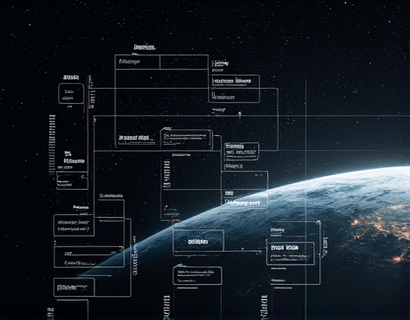Real-Time Government Data: Empowering Citizens and Enhancing Civic Participation
In recent years, the concept of open data has gained significant traction, particularly in the realm of government operations. Open data refers to information that is freely available to everyone to use and republish as they wish, without restrictions from copyright, patents, or other mechanisms of control. When applied to government data, open data initiatives aim to increase transparency, foster innovation, and enhance civic participation. This article delves into the impact of real-time government data on transparency and engagement in democratic processes, exploring how open access to such data can transform governance and promote a more collaborative and accountable government.
The push for open government data is rooted in the belief that information is a public good, essential for an informed citizenry and a healthy democracy. Traditional governance models often suffer from a lack of transparency, with citizens having limited access to information about government activities, decisions, and expenditures. This opacity can lead to mistrust, inefficiency, and corruption. Open data initiatives seek to break down these barriers by making government data readily available to the public in a usable and accessible format.
Real-time government data takes this concept a step further by providing up-to-the-minute information on various aspects of government operations. This immediacy is crucial for several reasons. First, it allows citizens to stay informed about current events and issues as they unfold, enabling them to engage in timely discussions and decision-making processes. Second, real-time data can enhance the responsiveness of government agencies, as officials can quickly react to emerging situations and provide updates to the public. Finally, real-time data can facilitate better oversight and accountability, as citizens and watchdog organizations can monitor government actions and outcomes in near real-time.
The benefits of open real-time government data are manifold. For citizens, access to timely information empowers them to make informed decisions, participate more actively in civic life, and hold their elected officials accountable. For instance, real-time data on public transportation can help commuters plan their journeys more efficiently, while real-time crime statistics can inform community safety initiatives. Moreover, open data can drive innovation by providing a rich source of information for developers, researchers, and entrepreneurs to create new applications and services that benefit society.
From a governance perspective, open real-time data can lead to more transparent and efficient public administration. By making data readily available, government agencies can reduce the need for Freedom of Information Act (FOIA) requests, which are often time-consuming and costly. This transparency can also reduce the risk of corruption, as officials are more likely to act ethically when their actions are publicly visible. Additionally, real-time data can streamline processes by providing accurate and up-to-date information that can be used to optimize resource allocation, improve service delivery, and enhance policy-making.
One of the key challenges in implementing open real-time government data initiatives is ensuring the quality and reliability of the data. Accurate and consistent data is essential for building trust and ensuring that the information is useful to the public. Governments must invest in robust data management systems and establish clear standards for data collection, storage, and dissemination. Furthermore, user-friendly interfaces and tools are necessary to make the data accessible to a broad audience, including those with limited technical expertise.
Another important aspect is the need for ongoing engagement with the public to understand their needs and preferences regarding open data. Governments should actively seek feedback and collaborate with civic organizations, academia, and the private sector to identify areas where open data can have the greatest impact. Public consultations, workshops, and online forums can facilitate this dialogue and ensure that open data initiatives are aligned with the needs of the community.
The success of open real-time government data initiatives also depends on the legal and regulatory framework that supports data openness. Governments must enact policies that mandate the release of certain types of data and establish guidelines for data sharing and reuse. Privacy and security concerns must be addressed to ensure that sensitive information is protected while still making relevant data available to the public. International best practices and standards can serve as valuable references in shaping these policies.
Case studies from around the world demonstrate the positive impact of open real-time government data. For example, the city of New York's OpenDataNYC platform provides a comprehensive repository of city data, covering areas such as budget, permits, and public health. This platform has enabled citizens to track city spending, monitor environmental quality, and identify areas in need of improvement. Similarly, the UK's Data.gov.uk offers a wide range of government data sets, fostering innovation and driving economic growth through data-driven solutions.
In Sweden, the government has taken a proactive approach to open data by adopting a comprehensive open data strategy that includes a commitment to releasing all non-sensitive government data by default. This strategy has led to the creation of numerous applications and services that improve public services and enhance citizen engagement. For instance, a real-time data feed on public transportation has been integrated into mobile apps, making it easier for residents to plan their commutes and reducing traffic congestion.
The transformative potential of open real-time government data extends beyond individual cities and countries. At the international level, organizations such as the Open Government Partnership (OGP) bring together governments committed to promoting transparency, accountability, and civic participation through open data. The OGP provides a global platform for sharing best practices, setting standards, and holding each other accountable in the pursuit of open governance.
As the world becomes increasingly digital, the importance of open real-time government data will only grow. Governments that embrace this shift can build stronger, more resilient democracies where citizens are well-informed, actively engaged, and empowered to contribute to the public good. The path to open and participatory governance is clear, and the time to act is now. By harnessing the power of real-time data, we can create a future where transparency and collaboration are the cornerstones of effective governance.










































